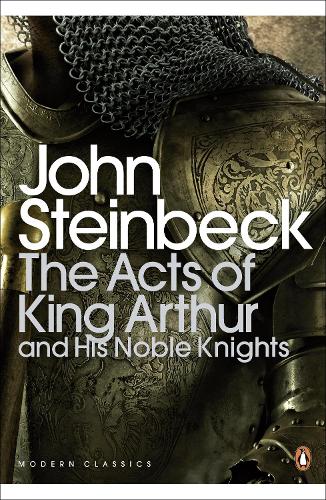
The Acts of King Arthur and his Noble Knights
(Paperback)
Publishing Details
The Acts of King Arthur and his Noble Knights
By (Author) John Steinbeck
Edited by Chase Horton
Penguin Books Ltd
Penguin Classics
26th June 2001
3rd May 2001
United Kingdom
Classifications
General
Fiction
Folklore studies / Study of myth
398.220942
Physical Properties
Paperback
384
Width 130mm, Height 198mm, Spine 22mm
284g
Description
Steinbeck's brilliant rendition of stories heroic, romantic and tragic from Malory's Morte D'Arthur chronicles the life of Arthur from his mysterious birth through battles and adventures to his establishment as king. In characteristic Steinbeck style the tales - including the fateful marriage to Guinevere and the creation of the fellowship of the knights of the Round Table - emphasize the human qualities of legendary characters. Steinbeck transposed, contextualized and added to the stories, so that they are as alive for us today as they were to Malory's readers some five hundred years ago. The Acts of King Arthur was published posthumously in 1976. An appendix of letters written by Steinbeck gives a fascinating insight into how he approached Malory's original work.
Author Bio
John Steinbeck was born in Salinas, California, in 17 February 1902. After studying English at Stanford University, he held several jobs including working as a hod-carrier, apprentice painter, laboratory assistant, ranch hand, fruit-picker, construction worker at Madison Square Gardens, New York, and reporter for the New York American. In 1935 he became a full-time writer and was a special writer for the United States Army Air Force during World War II. Among his most renowned works are Of Mice and Men, Cannery Row, East of Eden and The Grapes of Wrath, which won the Pulitzer Prize in 1940. In 1926 Steinbeck was awarded the Nobel Prize for Literature as a mark of his outstanding contribution to literature, his unquestionable popularity and his versatility. In his speech accepting the Nobel Prize, Steinbeck gave his view of authorship- 'The ancient omission of the writer has not changed. He is charged with exposing our may grevious faults and failures, with dredging up to the light our dark and dangerous dreams for the purpose of improvement. Furthermore, the writer is delegated to declare and to celebrate man's proven capacity for greatness of heart and spirit for gallantry in defeat - for courage, compassion and love.' John Steinbeck died on 20th December 1968.
